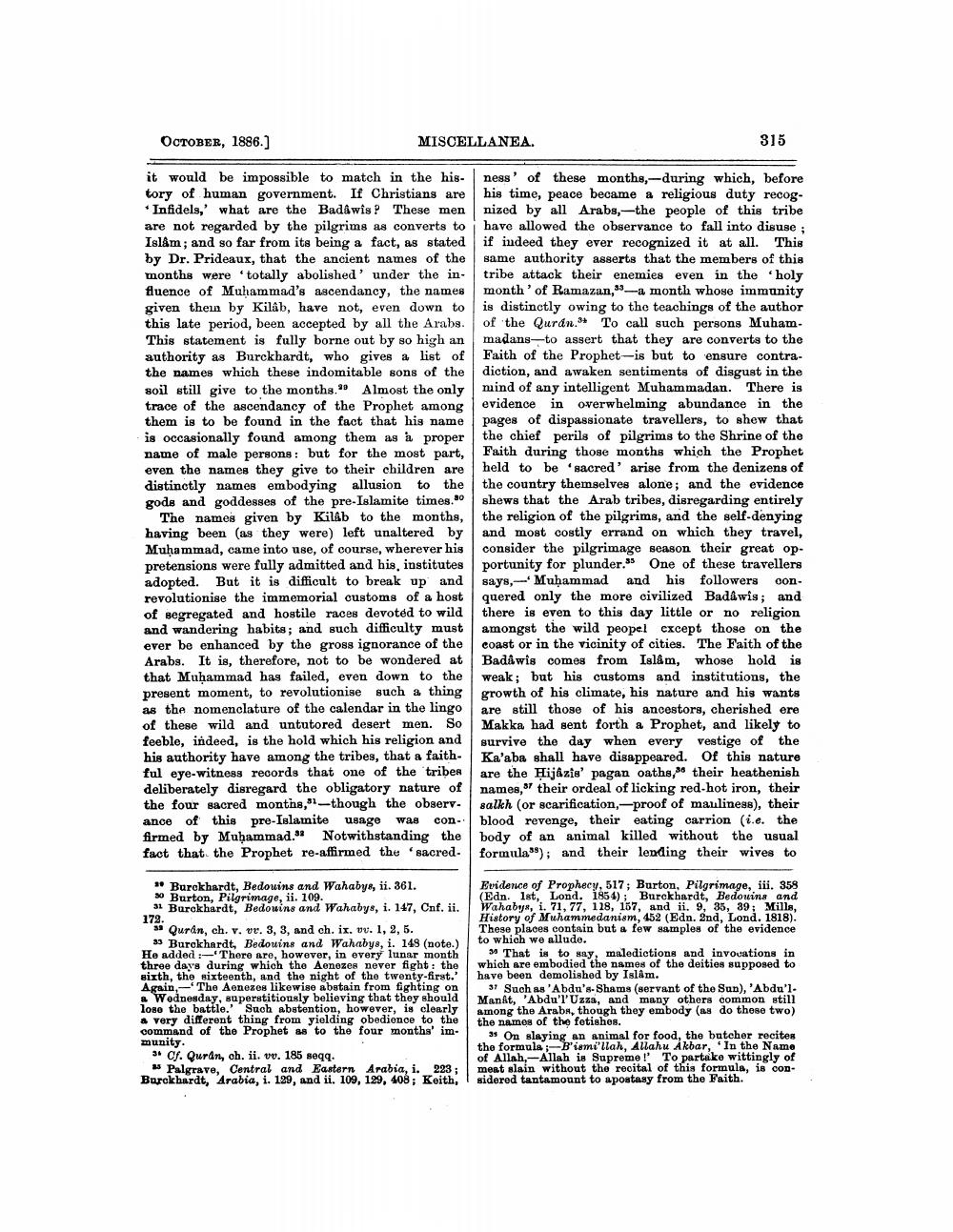________________
OCTOBER, 1886.)
MISCELLANEA.
315
it would be impossible to match in the his- ness' of these months,-during which, before tory of human government. If Christians are his time, peace became a religious duty recog.
Infidels,' what are the Badawis P These men nized by all Arabs,—the people of this tribe are not regarded by the pilgrims as converts to have allowed the observance to fall into disuse : Islâm; and so far from its being a fact, as stated if indeed they ever recognized it at all. This by Dr. Prideaux, that the ancient names of the same authority asserts that the members of this months were totally abolished' under the in- tribe attack their enemies even in the holy fluence of Muhammad's ascendancy, the names month of Ramazan,”-a month whose immunity given then by Kilâb, have not, even down to is distinctly owing to the teachings of the author this late period, been accepted by all the Arabs. of the Quran.* To call such persons Muham. This statement is fully borne out by so high an madans--to assert that they are converts to the authority as Burckhardt, who gives a list of Faith of the Prophet-is but to ensure contrathe names which these indomitable sons of the diction, and awaken sentiments of disgust in the soil still give to the months. Almost the only mind of any intelligent Muhammadan. There is trace of the ascendancy of the Prophet among evidence in overwhelming abundance in the them is to be found in the fact that his name pages of dispassionate travellers, to shew that is occasionally found among them as à proper the chief perils of pilgrims to the Shrine of the name of male persons : but for the most part,
Faith during those months which the Prophet even the names they give to their children are held to be 'sacred' arise from the denizens of distinctly names embodying allusion to the the country themselves alone; and the evidence gods and goddesses of the pre-Islamite times. shews that the Arab tribes, disregarding entirely
The names given by Kilab to the months, the religion of the pilgrims, and the self-denying having been as they were) left unaltered by and most costly errand on which they travel, Muhammad, came into use, of course, wherever his consider the pilgrimage season their great oppretensions were fully admitted and his, institutes portunity for plunder. One of these travellers adopted. But it is difficult to break up and says, Muhammad and his followers oonrevolutionise the immemorial customs of a host quered only the more civilized Badawis; and of segregated and hostile races devoted to wild there is even to this day little or no religion and wandering habits; and such difficulty must amongst the wild peopel except those on the ever be enhanced by the gross ignorance of the coast or in the vicinity of cities. The Faith of the Arabs. It is, therefore, not to be wondered at Badawis comes from Islam, whose hold is that Muhammad has failed, even down to the weak; but his customs and institutions, the present moment, to revolutionise such a thing growth of his climate, his nature and his wants as the nomenclature of the calendar in the lingo are still those of his ancestors, cherished ere of these wild and untutored desert men. So Makka had sent forth a Prophet, and likely to feeble, indeed, is the hold which his religion and survive the day when every vestige of the his authority have among the tribes, that a faith- Ka'aba shall have disappeared. Of this nature ful eye-witness records that one of the tribes
are the Hijazie' pagan oaths, their heathenish deliberately disregard the obligatory nature of names, their ordeal of licking red-hot iron, their the four sacred months, though the observ. salkh (or scarification-proof of mauliness), their ance of this pre-Islamite usage was con- blood revenge, their eating carrion (i.e. the firmed by Muhammad." Notwithstanding the body of an animal killed without the usual fact that the Prophet re-affirmed the 'sacred- formula"); and their lending their wives to
* Burckhardt, Bedouins and Wahabys, ii. 361. so Burton, Pilgrimage, ii. 109.
31 Burckhardt, Bedouins and Wahabys, i. 147, Cnf. ii. 172.
sa Quran, ch. v. vr. 3, 3, and ch. ix. v. 1, 2, 5.
33 Burckhardt, Bedouins and Wahabys, i. 148 (note.) He added : There are, however, in every lunar month three days during which the Aenezee never fight : the sixth, the sixteenth, and the night of the twenty-first.' Again, --The Aenezes likewise abstain from fighting on
Wednesday, superstitiously believing that they should lose the battle.' Such abstention, however, is clearly & very different thing from yielding obedience to the command of the Prophet ss to the four months' immunity.
3. Cf. Quran, ch. ii. vv. 185 seqq.
* Palgrave, Central and Eastern Arabia, i._223; Borckhardt, Arabia, i. 199, and ii. 109, 129, 408; Keith,
Evidence of Prophecy, 517; Burton, Pilgrimage, iii. 359 (Edn. lst, Lond. 1854); Burckhardt, Bedouing and Wahabya, i. 71, 77, 118, 167, and ii. 9, 35, 39; Mills, History of Muhammedanism, 452 (Edn. 2nd, Lond. 1818). These places contain but a few samples of the evidence to which we allude.
That is to say, maledictions and invocations in which are embodied the names of the deities supposed to have been demolished by Islam.
37 Such as 'Abdu's-Shams (servant of the Sun), 'Abdu'l. Manåt, 'Abdu'l'Uzza, and many others common still among the Arabs, though they embody (as do these two) the names of the fetishes.
3 On slaying an animal for food, the butcher recites the formula-B'ismillah, Allahu Akbar, In the Name of Allah, -Allah is Supreme! To partake wittingly of meat slain without the recital of this formula, is considered tantamount to apostasy from the Faith.




